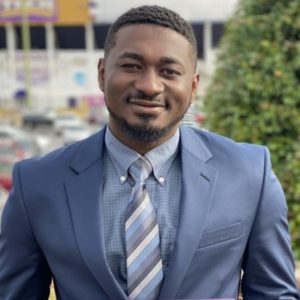March 03, 2024
Equipped with a Ph.D. in civil engineering and supported by an advisor-turned mentor at Mizzou Engineering, Aboah Armstrong has joined the faculty of North Dakota State University.

This spring, Armstrong started as assistant professor in the civil, construction and environmental engineering department, where he hopes to share the types of educational experiences he received at Mizzou.
“I’m hoping my classes will be fun, and that it will be a mix of knowledge and opportunities to apply skills right away to real-life problems,” Armstrong said. “I want to find the right balance, to make it fun in a practical way while also teaching theoretical knowledge.”
The tenure-track position also allows him to build upon research around intelligent transportation systems, autonomous and connected vehicles, travel demand modeling and other transportation planning.
Armstrong’s journey to academia has been winding. He grew up in a developing country and saw first-hand how construction was critical to economic growth. He began undergraduate studies interested in structural engineering, but later shifted to transportation to work on pressing issues around traffic congestion, safety and infrastructure.
“After earning my master’s, I wanted to move into more specialized areas, and Mizzou had faculty members in those areas to equip me with the skills and knowledge I needed,” he said.
At Mizzou Engineering, Armstrong worked with Associate Professor Yaw Adu-Gyamfi, who introduced him to research that leverages artificial intelligence to predict pavement failure, model traffic flow and inform roadway and bridge design.
Along the way, Armstrong saw the power of working in an academic setting.
“My passion for teaching stemmed from my undergraduate years—I served as a teaching assistant in my home country, as well as during my master’s and when I came to Mizzou,” he said. “For me, academia provides an opportunity to explore different areas and explore new things. That’s where I wanted to focus my energy, and Mizzou was very instrumental in that process.”
Under Adu-Gyamfi’s guidance, Armstrong had opportunities to work both independently and as part of a collaborative team, using LIDAR, training models and other emerging technologies.
At Mizzou, Armstrong also had opportunities to present research, building his confidence and providing skills needed to teach complex subject matter.
“I definitely recommend Mizzou for graduate school,” he said. “The College and department priorities are geared toward the excellence of students. They make that a priority, which helps a lot. And Dr. Yaw was a great advisor, and still mentors me as I begin my career.”
Pursuing an academic career isn’t easy, he said, “but possible when you put your mind to it and work diligently.”
Learn more about graduate school at Mizzou.